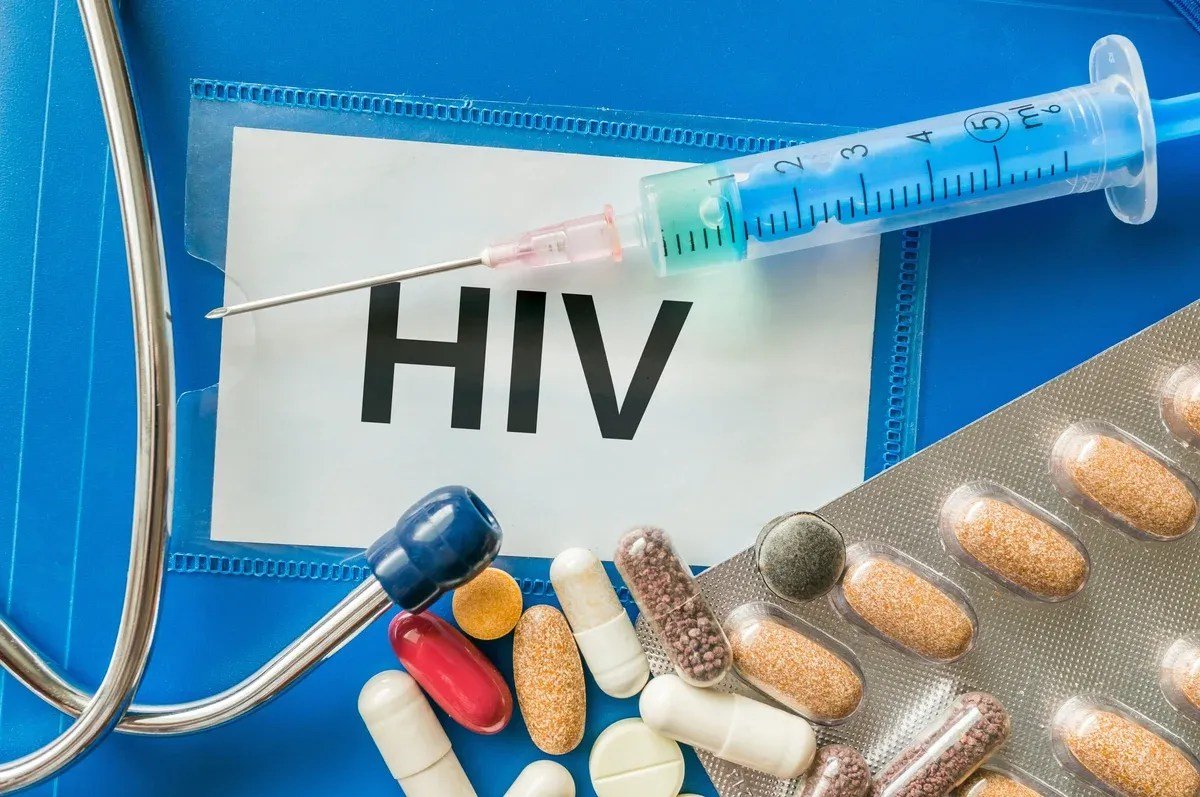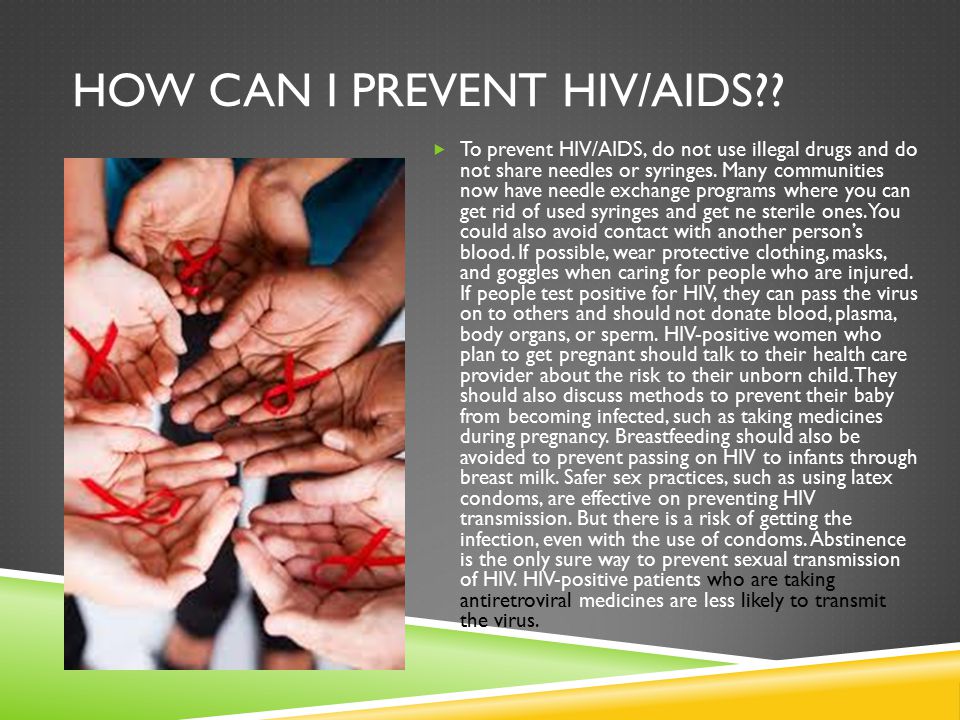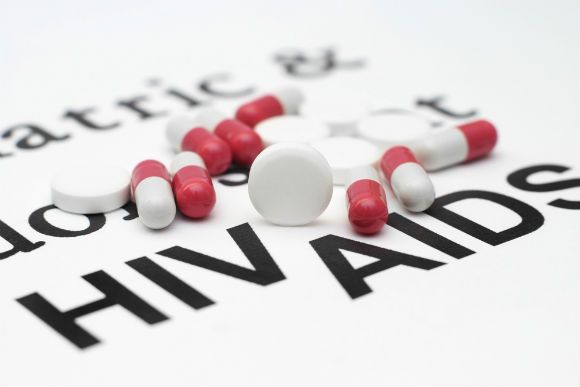How Do You Get Or Transmit Hiv
You can only get HIV by coming into direct contact with certain body fluids from a person with HIV who has a detectable viral load. These fluids are:
- Blood
- Semen and pre-seminal fluid
- Rectal fluids
- Vaginal fluids
- Breast milk
For transmission to occur, the HIV in these fluids must get into the bloodstream of an HIV-negative person through a mucous membrane open cuts or sores or by direct injection.
People with HIV who take HIV medicine daily as prescribed and get and keep an undetectable viral load have effectively no risk of sexually transmitting HIV to their HIV-negative partners.
Are Hiv Medicines Used At Other Times To Prevent Hiv Transmission
Yes, HIV medicines are also used for post-exposure prophylaxis and to prevent mother-to-child transmission of HIV.
- Post-exposure prophylaxis PEP means taking HIV medicines within 72 hours after a possible exposure to HIV to prevent HIV infection. PEP should be used only in emergency situations. It is not meant for regular use by people who may be exposed to HIV frequently. For more information, read the ClinicalInfo fact sheet on Post-Exposure Prophylaxis .
- Prevention of mother-to-child transmission of HIV Pregnant women with HIV take HIV medicines for their own health and to prevent mother-to-child transmission of HIV. After birth, babies born to women with HIV receive HIV medicine to protect them from infection with any HIV that may have passed from mother to child during childbirth. For more information, read the ClinicalInfo fact sheet on Preventing Mother-to-Child Transmission of HIV.
What Should People Know About Taking Hiv Medicines
Taking HIV medicines keeps people with HIV healthy and prevents HIV transmission. Taking HIV medicines every day and exactly as prescribed also reduces the risk of drug resistance.
But sometimes HIV medicines can cause side effects. Most side effects from HIV medicines are manageable, but a few can be serious. Overall, the benefits of HIV medicines far outweigh the risk of side effects. In addition, newer HIV medicines cause fewer side effects than medicines used in the past. As HIV treatment continues to improve, people are less likely to have side effects from their HIV medicines.
HIV medicines can interact with other HIV medicines in an HIV regimen or with other medicines a person is taking. Health care providers carefully consider potential drug interactions before recommending an HIV regimen.
Read Also: How Long Can Hiv Lay Dormant
Hiv Symptoms In Men: Is There A Difference
Symptoms of HIV vary from person to person, but theyre similar in men and women. These symptoms can come and go or get progressively worse.
If a person has been exposed to HIV, they may also have been exposed to other sexually transmitted infections . These include:
- human papillomavirus , which can cause genital warts and lead to cervical cancer
While not related to HIV symptoms, another risk for women with HIV is that the virus can be transmitted to a baby during pregnancy. However, antiretroviral therapy is considered safe during pregnancy.
Women who are treated with antiretroviral therapy are at very low risk for transmitting HIV to their baby during pregnancy and delivery. Breastfeeding is also affected in women with HIV. The virus can be transferred to a baby through breast milk.
In the United States and other settings where formula is accessible and safe, its recommended that women with HIV not breastfeed their babies. For these women, use of formula is encouraged.
Options besides formula include pasteurized banked human milk.
For women who may have been exposed to HIV, its important to know what symptoms to look for.
AIDS refers to acquired immunodeficiency syndrome. With this condition, the immune system is weakened due to HIV thats typically gone untreated for many years.
If HIV is found and treated early with antiretroviral therapy, a person will usually not develop AIDS.
Symptoms of AIDS can include:
Finding An Hiv Specialist

HIV specialists can be found in most large cities. And HIV specialists often serve rural communities as well. Here are some ways that will help you find one:
- Contact large hospitals in your area, especially ones that are affiliated with a university. HIV specialists can usually be found in the infectious disease departments of those hospitals. Please note that not all infectious disease specialists are necessarily HIV specialists. When making the call, make sure you request an HIV specialist.
- Speak with the local HIV/AIDS service agencies in your area. They will have a list of local HIV specialists and, in most cases, will help you get connected with one of them.
- Word of mouth is a good source when looking for an HIV specialist. Listen to others who are living with HIV. They may be able to recommend a specialist.
Don’t Miss: Does Hiv Cause Hair Loss
How To Select The Right Hiv Specialist
Finding a healthcare provider is the first and most important step you will take after being diagnosed with HIV. Despite ever simpler drug regimens, HIV remains a dynamic disease that requires specially trained medical professionals able to deliver the high levels of care specific to your health needs.
So what are the qualities of a good HIV specialist? Are there ways to ascertain this or tools you can use to narrow the search?
What Is Hiv Treatment
HIV treatment involves taking medicines that slow the progression of the virus in your body. HIV is a type of virus called a retrovirus, and the combination of drugs used to treat it is called antiretroviral therapy . ART is recommended for all people living with HIV, regardless of how long theyve had the virus or how healthy they are. ART must be taken every day, exactly as your health care provider prescribes.
Also Check: Does Cookie Johnson Have Hiv
Does Antiretroviral Treatment Have Side
As with all medication, starting to take ARVs can cause some side-effects, particularly in the first few days of treatment. This is another topic you could discuss with your doctor, as it might also affect your choice of drugs. Your treatment will be monitored and you may be recommended to switch drugs if they aren’t working for you or if you’re finding the side effects difficult to manage.
When Should I Start Antiretroviral Treatment
Its now recommended that people diagnosed with HIV start antiretroviral treatment straight away. This is because the sooner you start treatment, the sooner you can benefit from it. Starting treatment as soon as possible protects your immune system from damage and gives you the best chance of staying strong and healthy in the future.
I immediately started my treatment, and boy I have to tell you, I never experienced any sort of setback and have never been sick – and now I am even undetectable.
– Mpho, South Africa
You May Like: Does Cookie Johnson Have Hiv
What Is A Cd4 Count For A Healthy Person
The CD4 count of a healthy person is 500 to 1,600 cells per cubic millimeter of blood , according to HIV.gov.
As mentioned by CD4 cells are white blood cells that fight infection and play an important role in your immune system. CD4 cells send a message to the immune cells if there are external invaders such as bacteria or viruses.
When there arent enough CD4 cells in the body, it becomes more difficult for the immune system to fight back against external invaders.
A CD4 count is used to measure the volume of CD4 cells in your blood. If a CD4 count comes back at less than 200 cell/mm3, a person will be diagnosed with AIDs.
The purpose of HIV treatment is to keep CD4 cells at a stable level.
How Can You Get Hiv
HIV is found in the following bodily fluids of someone living with the virus:
- blood
- vaginal fluids
- breastmilk.
For you to get HIV, these bodily fluids need to get into your blood through a mucous membrane , via shared injecting equipment, or through broken skin .
There is not enough HIV virus in other bodily fluids, like saliva, sweat or urine, to transmit it from one person to another.
Someone living with HIV who has an undetectable viral load, meaning effective treatment has lowered the amount of virus in their blood to levels where it cannot be detected by a normal blood test, cannot pass on HIV.
A person living with HIV with a detectable viral load can pass the virus to others whether they have symptoms or not.
HIV is most infectious in the first few weeks after infection. At this time many people are unaware of their status.
The main ways you can get HIV are:
Recommended Reading: Does Hiv Cause Hair Loss
Rash Related To Medication
While rash can be caused by HIV co-infections, it can also be caused by medication. Some drugs used to treat HIV or other conditions can cause a rash.
This type of rash usually appears within a week or 2 weeks of starting a new medication. Sometimes the rash will clear up on its own. If it doesnt, a change in medications may be needed.
Rash due to an allergic reaction to medication can be serious.
Other symptoms of an allergic reaction include:
- trouble breathing or swallowing
- dizziness
- fever
Stevens-Johnson syndrome is a rare allergic reaction to HIV medication. Symptoms include fever and swelling of the face and tongue. A blistering rash, which can involve the skin and mucous membranes, appears and spreads quickly.
When 30 percent of the skin is affected, its called toxic epidermal necrolysis, which is a life threatening condition. If this develops, emergency medical care is needed.
While rash can be linked with HIV or HIV medications, its important to keep in mind that rashes are common and can have many other causes.
What Are The Challenges

While research on a cure is promising, there are some challenges. One is that we donât fully understand how HIV reservoirs work. Scientists are learning how to find, measure, and destroy them.
What about stem cell therapy? The CCR5 mutation that protects you from HIV is very rare, so itâs hard to find donor cells. Also, stem cell therapy is risky. People can reject donor cells and become very ill. Scientists are trying to find therapies that make a personâs own cells resistant to the virus, so they wonât need donor cells.
Another challenge is that males are the subjects of most HIV clinical trials, but about half of people with the virus are female. We need more studies to look at whether treatments will work on women and girls.
Even though research is very promising, it could be a few years before these treatments are tested to be sure they work well and are safe to use in many people who have HIV.
AIDSinfo.gov: âHIV Treatments: The Basics.â
National Institute of Allergy and Infectious Diseases: âHIV Cure.â
amfAR: âThe Countdown to a Cure for AIDS,â âPathways to an HIV Cure,â âMaking Sense of the Three Types of HIV Cure: The Berlin Patient, the Mississippi Child, and the VISCONTI Cohort.â
Fred Hutchinson Cancer Research Center: âWorld AIDS Day: Stepping up the search for a cure.â
Delaney Cell and Genome Engineering Initiative: âDefeat HIV: Scientific Overview.â
Don’t Miss: Hiv Stays Alive In Dried Blood
Symptoms Of Hiv Infection
Some people may not develop any symptoms after contracting HIV and could remain undiagnosed until the symptoms of AIDS appear. This could be up to 10 years later.
However, 50% or more of people living with HIV may develop mild flu-like symptoms within 2 to 4 weeks. Early symptoms may include:
- chills
- muscle aches
- swollen glands
The symptoms of HIV infection may last from a few days to weeks. They may go away on their own.
Misdiagnosis of early HIV infection is common. If you think you have HIV, speak with your health care provider about being tested.
Living With Hiv: What To Expect And Tips For Coping
More than 1.2 million people in the United States are living with HIV. Its different for everybody, but with treatment, many can expect to live a long, productive life.
The most important thing is to start antiretroviral treatment as soon as possible. By taking medications exactly as prescribed, people living with HIV can keep their viral load low and their immune system strong.
Its also important to follow up with a healthcare provider regularly.
Other ways people living with HIV can improve their health include:
- Make their health their top priority. Steps to help people living with HIV feel their best include:
- fueling their body with a well-balanced diet
- exercising regularly
- avoiding tobacco and other drugs
- reporting any new symptoms to their healthcare provider right away
Don’t Miss: Does Cookie Johnson Have Hiv
Can Hiv Go Away On Its Own
HIV will not go away on its own. HIV, if left untreated will progress through acute to chronic infection. If there is no treatment during the first two stages of HIV, HIV will progress to AIDs.
If HIV is diagnosed and treated in the early stages, treatment will lower the risk of HIV progressing to AIDs.
Getting Support With Starting Treatment
Its important that you feel ready to start ART and understand how to take it properly. Current HIV treatment has to be taken every day for the rest of your life. You might feel good about starting HIV treatment, because it is something you can do to stay healthy and strong. But it is also normal to feel worried about it, or to have questions.
In addition to talking to your doctor, you may find it helpful to talk to someone who has experience of taking HIV treatment. Many clinics have peer mentors, who can offer support and information, or can put you in touch with community organisations and peer support groups.
Don’t Miss: How Long Does It Take For Hiv To Become Aids
What If I Have Another Illness Or A Co
You may have a co-infection or another illness such as cardiovascular disease, HIV-related cancer, chronic kidney disease or HIV-associated neurocognitive impairment.
In these situations your doctor may need to tailor your antiretroviral treatment or treat your other condition before starting your HIV treatment. This will be explained to you by the clinicians looking after you.
Changing Attitudes About Hiv
When someone is diagnosed with HIV, other people may have negative attitudes and beliefs about that person’s behaviour, lifestyle or circumstances in life. These negative associations form what’s called stigma, an experience that can decrease quality of life because it includes:
- judging
Efforts to end stigma will help to:
- prevent new infections
- ensure that people living with HIV receive the care, treatment and support they need
Also Check: Can You Get Hiv From Dried Blood
Questions To Ask About Each Drug
One of the most important things you can do to make sure you take your medicine correctly is to talk with your medical provider about your lifestyle, such as your sleeping and eating schedule. If your provider prescribes a drug, be sure and ask the following questions :
- What dose of the drug should be taken? How many pills does this mean?
- How often should the drug be taken?
- Does it matter if it is taken with food, or on an empty stomach?
- Does the drug have to be kept in a refrigerator?
- What are the possible side effects of the drug?
- What should be done to deal with the side effects?
- How severe do side effects have to be before a provider is called?
During every medical visit you should talk about whether you are having trouble staying on your treatment plan. Studies show that people who take their medicine in the right way get the best results: their viral loads stay down, their CD4 counts stay up, and they feel healthier.
Nucleoside Reverse Transcriptase Inhibitors

These drugs interrupt the virus from duplicating, which may slow the spread of HIV in the body. They include:
- Abacavir
- Zalcitabine
- Zidovudine
Combinations of NRTIs make it possible to take lower doses and maintain effectiveness. These drugs include Combivir , Trizivir , Epzicom and Truvada . We expect more combination drugs to be available in the future.
You May Like: Average Hiv Life Expectancy
Prevention Access Campaign U=u Partner
Michigan Medicine is a community partner with the Prevention Access Campaign to support Undetectable = Untransmittable . U=U means that people living with HIV can feel confident that if they have an undetectable viral load and take their medications as prescribed, they cannot pass on HIV to sexual partners.
In endorsing the U=U message, Michigan Medicine and HATP believe the following:
- We can comfortably say that a person living with HIV, who is on ART and has an undetectable viral load, cannot transmit HIV to sexual partners .
- We agree that the health and prevention benefits of viral suppression are platforms to underscore the importance of universal access to treatment and care for all people living with HIV worldwide.
- We agree that treatment is a personal choice, that treatment is first and foremost for personal health, that there are unjust barriers to accessing treatment, that not all people living with HIV will achieve an undetectable viral load, and there is no place for stigmatizing anyone living with HIV at any viral load.
U=U offers freedom and hope. For many people living with HIV and their partners, U=U opens up social, sexual, and reproductive choices they never thought would be possible. Michigan Medicine and HATP are proud to share the message of U=U with our patients and the wider community.